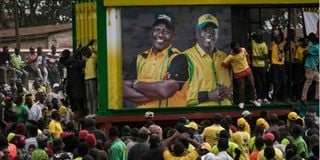How campaign heat conceives state capture

A picture on a campaign trailer shows Kenya's Deputy President William Ruto (Left) and his running mate Rigathi Gachagua of United Democratic Alliance (UDA) Party during their first rally after being officially nominated as Presidential candidates by the Independent Electoral and Boundaries Commission (IEBC).
Listening to Kenya Kwanza Alliance leaders whining about state capture, one may think that the latter is a new thing in town. On the contrary, it has been with us, and may not end soon.
Transparency International defines state capture as “a situation where powerful individuals, institutions, companies or groups within or outside a country use corruption to shape a nation’s policies, legal environment and economy to benefit their own private interests”.
Granted, state capture is an indirect rule by a powerful minority – within and/or outside government – that determine how governments conduct public business. These pressure groups influence government decisions as long as they get their keep.
It is instructive that most directives, resolutions and policies made by governments are not always a result of carefully considered positions. Many are outcomes of wilful machinations and crafty schemes orchestrated by selfish individuals.
For instance, a state department may waive taxes on some commodities, or even write off certain debts, all disguised to cushion certain individuals. The rest become collateral beneficiaries.
But just how does a country fall into such captivity? The best illustration is the manner of our politics. During electioneering, various candidates pull out money bags to oil their campaigns.
Such has been the practice to the extent that the electorate, especially rural folks, regard campaigns as a season of harvest. Contestants are gauged on the basis of the depth of their pockets.
Rule of law
Which brings us to the place of campaign funders. Practically, no one will invest in an unprofitable venture. Even philanthropic actions may be undergirded by ethical egoism.
Here, one pretends to be magnanimous when in real sense they are after some benefit. Granted, individuals behind the campaign largesse must claim their share when their preferred candidates win.
If one donated a helicopter, for instance, it must earn a profit. If the other brought in money, they must claim more through inflated contracts for provision of goods and services – whether necessary or otherwise.
Those who followed you all through, shouting themselves hoarse and answering back salvos on your behalf, must land plum appointments or have their kin eat in their stead.
That’s when unnecessary positions are created, specifically for these parasites. Slowly, state capture sets in. Cronies, family and tribesmen that sponsored you won’t allow you to call the tunes, especially if you intend to vie for another term. There’s no free lunch, literally.
You’ve seen the leading political factions display their financial muscles, indicative of solid sponsorship. Unless the eventual winner intends to operate differently in service to the public, you shouldn’t expect a reduction in corruption.
State capture, as defined, is the most insidious form of corruption. If the incoming government will help citizens, it must choose the rule of law over populism. It must risk being a one-term regime by doing the right thing, even if it means betraying their tactful, cunning sponsors. Fruits of freedom are watered by blood.
Wycliffe Osabwa, Lecturer, Alupe University College, Busia. [email protected]





